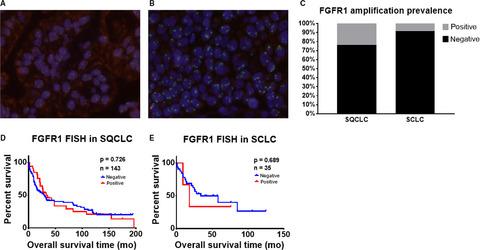当前位置:
X-MOL 学术
›
Cancer Med.
›
论文详情
Our official English website, www.x-mol.net, welcomes your
feedback! (Note: you will need to create a separate account there.)
Fibroblast growth factor receptor 1 gene amplification and protein expression in human lung cancer.
Cancer Medicine ( IF 2.9 ) Pub Date : 2020-03-24 , DOI: 10.1002/cam4.2994 Omar Elakad 1 , Anna-Maria Lois 1 , Katja Schmitz 1 , Sha Yao 1 , Sara Hugo 1 , Laura Lukat 1 , Marc Hinterthaner 2 , Bernhard C Danner 2 , Alexander von Hammerstein-Equord 2 , Kirsten Reuter-Jessen 1 , Hans-Ulrich Schildhaus 1 , Philipp Ströbel 1 , Hanibal Bohnenberger 1
Cancer Medicine ( IF 2.9 ) Pub Date : 2020-03-24 , DOI: 10.1002/cam4.2994 Omar Elakad 1 , Anna-Maria Lois 1 , Katja Schmitz 1 , Sha Yao 1 , Sara Hugo 1 , Laura Lukat 1 , Marc Hinterthaner 2 , Bernhard C Danner 2 , Alexander von Hammerstein-Equord 2 , Kirsten Reuter-Jessen 1 , Hans-Ulrich Schildhaus 1 , Philipp Ströbel 1 , Hanibal Bohnenberger 1
Affiliation

|
BACKGROUND
Targeting fibroblast growth factor receptor 1 (FGFR1) is a potential treatment for squamous cell lung cancer (SQCLC). So far, treatment decision in clinical studies is based on gene amplification. However, only a minority of patients have shown durable response. Furthermore, former studies have revealed contrasting results regarding the impact of FGFR1 amplification and expression on patient's prognosis.
AIMS
Here, we analyzed prevalence and correlation of FGFR1 gene amplification and protein expression in human lung cancer and their impact on overall survival. MATERIALS & METHODS: FGFR1 gene amplification and protein expression were analyzed by fluorescence in situ hybridization and immunohistochemistry (IHC) in 208 SQCLC and 45 small cell lung cancers (SCLC). Furthermore, FGFR1 protein expression was analyzed in 121 pulmonary adenocarcinomas (ACs). Amplification and expression were correlated to each other, clinicopathological characteristics, and overall survival.
RESULTS
FGFR1 was amplified in 23% of SQCLC and 8% of SCLC. Amplification was correlated to males (P = .027) but not to overall survival. Specificity of immunostaining was verified by cellular CRISPR/Cas9 FGFR1 knockout. FGFR1 was strongly expressed in 9% of SQCLC, 35% of AC, and 4% of SCLC. Expression was correlated to females (P = .0187) and to the absence of lymph node metastasis in SQCLC (P = .018) with no significant correlation to overall survival. Interestingly, no significant correlation between amplification and expression was detected.
DISCUSSION
FGFR1 gene amplification does not seem to correlate to protein expression.
CONCLUSION
We believe that patient selection for FGFR1 inhibitors in clinical studies should be reconsidered. Neither FGFR1 amplification nor expression influences patient's prognosis.
中文翻译:

人肺癌中成纤维细胞生长因子受体 1 基因扩增和蛋白表达。
背景靶向成纤维细胞生长因子受体 1 (FGFR1) 是鳞状细胞肺癌 (SQCLC) 的潜在治疗方法。迄今为止,临床研究中的治疗决策是基于基因扩增。然而,只有少数患者表现出持久的反应。此外,先前的研究揭示了关于 FGFR1 扩增和表达对患者预后的影响的对比结果。目的 在此,我们分析了人类肺癌中 FGFR1 基因扩增和蛋白表达的流行率和相关性及其对总生存期的影响。材料与方法:通过荧光原位杂交和免疫组织化学(IHC)在 208 例 SQCLC 和 45 例小细胞肺癌(SCLC)中分析 FGFR1 基因扩增和蛋白表达。此外,在 121 例肺腺癌 (AC) 中分析了 FGFR1 蛋白表达。扩增和表达相互关联、临床病理特征和总生存期相关。结果 FGFR1 在 23% 的 SQCLC 和 8% 的 SCLC 中扩增。扩增与男性相关(P = .027),但与总生存率无关。通过细胞 CRISPR/Cas9 FGFR1 敲除验证了免疫染色的特异性。FGFR1 在 9% 的 SQCLC、35% 的 AC 和 4% 的 SCLC 中强烈表达。表达与女性 (P = .0187) 和 SQCLC 中无淋巴结转移 (P = .018) 相关,与总生存率无显着相关性。有趣的是,没有检测到扩增和表达之间的显着相关性。讨论 FGFR1 基因扩增似乎与蛋白质表达无关。结论 我们认为应该重新考虑临床研究中患者对 FGFR1 抑制剂的选择。FGFR1 扩增和表达均不影响患者的预后。
更新日期:2020-03-24
中文翻译:

人肺癌中成纤维细胞生长因子受体 1 基因扩增和蛋白表达。
背景靶向成纤维细胞生长因子受体 1 (FGFR1) 是鳞状细胞肺癌 (SQCLC) 的潜在治疗方法。迄今为止,临床研究中的治疗决策是基于基因扩增。然而,只有少数患者表现出持久的反应。此外,先前的研究揭示了关于 FGFR1 扩增和表达对患者预后的影响的对比结果。目的 在此,我们分析了人类肺癌中 FGFR1 基因扩增和蛋白表达的流行率和相关性及其对总生存期的影响。材料与方法:通过荧光原位杂交和免疫组织化学(IHC)在 208 例 SQCLC 和 45 例小细胞肺癌(SCLC)中分析 FGFR1 基因扩增和蛋白表达。此外,在 121 例肺腺癌 (AC) 中分析了 FGFR1 蛋白表达。扩增和表达相互关联、临床病理特征和总生存期相关。结果 FGFR1 在 23% 的 SQCLC 和 8% 的 SCLC 中扩增。扩增与男性相关(P = .027),但与总生存率无关。通过细胞 CRISPR/Cas9 FGFR1 敲除验证了免疫染色的特异性。FGFR1 在 9% 的 SQCLC、35% 的 AC 和 4% 的 SCLC 中强烈表达。表达与女性 (P = .0187) 和 SQCLC 中无淋巴结转移 (P = .018) 相关,与总生存率无显着相关性。有趣的是,没有检测到扩增和表达之间的显着相关性。讨论 FGFR1 基因扩增似乎与蛋白质表达无关。结论 我们认为应该重新考虑临床研究中患者对 FGFR1 抑制剂的选择。FGFR1 扩增和表达均不影响患者的预后。











































 京公网安备 11010802027423号
京公网安备 11010802027423号